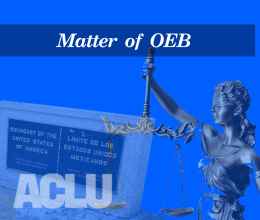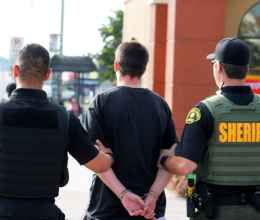Immigration and Customs Enforcement announced today significant changes to the "Secure Communities" program, stating that the program will be imposed on all states, whether or not state officials have declared the desire to opt out.
Because it threatens public safety and civil liberties, the ACLU believes that the Secure Communities program must be terminated immediately. The Department of Homeland Security should not only agree to the requests by governors and mayors to opt out of the program in their jurisdictions, but should suspend operations in all jurisdictions nationwide.
What is "Secure Communities?
Secure Communities is a federal immigration program launched by ICE in 2008. In jurisdictions where S-Comm has been activated, fingerprints of every individual arrested—not merely those convicted—by local law enforcement for any reason are run through ICE’s electronic immigration database. This allows ICE to identify non-citizens when they encounter local law enforcement, detain them, and begin deportation proceedings.
Though the administration claims that the goal of Secure Communities is to deport only dangerous criminals, in reality the program casts a much wider net, with disastrous implications for community safety and civil rights. As of July 2011, S-Comm has been activated in 46% of all counties nationwide—1,470 counties and counting.
What's the problem?
S-Comm makes communities LESS safe by undermining community trust in local law enforcement.
- S-Comm creates fear among immigrant communities, discouraging people from reporting crimes or seeking protection from the criminal justice system when they are victims of crime.
- Innocent victims of domestic violence have been put into ICE removal proceedings after calling police for help. This practice makes domestic violence survivors who are fearful of arrest and subsequent immigration repercussions less likely to contact authorities, which allows their abusers to continue abusing them with impunity.
- S-Comm hinders policing efforts of local law enforcement by reducing the trust of the community, thus cutting off police access to the information they need to investigate crimes.
S-Comm facilitates racial profiling.
- S-Comm is an open invitation to local law enforcement officials to target and arrest “foreign-looking” individuals, or those with limited English proficiency, solely for the purpose of booking them and transmitting their fingerprints to ICE (even though these officers typically do not have the authority to arrest individuals for suspected civil immigration violations alone).
- S-Comm encourages local law enforcement agencies and officials to use traffic and other minor offenses as pretexts for stopping and arresting people of color and initiating deportation proceedings.
S-Comm leads to the detention and deportation of people who have never committed a crime.
- Rather than focusing on people convicted of serious crimes as it is purported to do, S-Comm leads to the detention and deportation of many individuals who have never even been charged with a crime.
- S-Comm sends data to ICE at the point of arrest, before the arrested person has been convicted of any crime and, in some cases, even before they have been charged. Thus, S-Comm affects all arrestees, including people who are wrongly arrested or who would have been released without charges—turning on its head the core American principle that individuals are innocent until proven guilty.
- According to ICE’s own data, only 25% of individuals who have been removed or returned since S-Comm began have been convicted of “Level 1” offenses, even though Level 1 offenses are supposedly the principal targets of the program. A stunning 60% of the individuals removed were either “non-criminals” (meaning they had no criminal convictions on their record) or had been convicted of low-level offenses like traffic violations.
S-Comm lacks oversight and transparency.
- S-Comm was not created by statute, and there are no federal regulations governing its operation. Rather, DHS created S-Comm using appropriations funds, to be used for identification and removal of aliens convicted of a crime. Congress later specified that funds should prioritize the removal of aliens convicted of a serious crime.
- S-Comm operates with minimal internal or congressional oversight, leaving an accountability vacuum for the civil rights violations that occur.
What are states doing?
As the negative effects of S-Comm on safety and law enforcement became increasingly apparent, more and more states decided to opt out of the program. Governors in New York, Illinois, and Massachusetts have all recently announced that their states wish to terminate their S-Comm agreements with the federal government. Various public officials are speaking out across the country, explaining that federal officials lied to them about how the program would operate—and that in practice S-Comm has hurt, not helped, law enforcement efforts in their jurisdictions.
Here's what they're saying:
- New York Governor Andrew Cuomo’s office: “ [T]he program, conceived of as a method of targeting those who pose the greatest threat to our communities, is in fact having the opposite effect and compromising public safety by deterring witnesses from crimes and others from working with law enforcement.”
- Illinois Governor Pat Quinn: “The stated purpose of the program, as set forth in the MOA, is to ‘identify, detain, and remove from the United States aliens who have been convicted of serious criminal offenses and are subject to removal’ (emphasis added). . . [the] program in Illinois is contrary to the stated purpose of the MOA: more than 30% of those deported under the program have never been convicted of any crime, much less a serious one.”
- Boston Mayor Thomas Menino: “Secure Communities is diminishing trust, an essential part of the neighborhood fabric and a vital public safety tool.”
- Cambridge, Mass. Police Chief Robert Haas: “If we create a situation where entire communities in Cambridge refuse to come forward because of fear of deportation or losing a family member to deportation, we are undermining the public safety of us all.”
- San Francisco Sheriff Michael Hennessey: “We rely heavily on the trust and cooperation of all community members - including immigrants - to come forward and report crimes, either as victims or as witnesses. Otherwise, crimes go unreported - and this affects everyone, citizens and noncitizens alike.”








